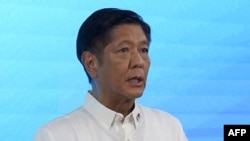Philippine President-elect Ferdinand Marcos Jr.’s national security adviser-designate has urged a stop to the dangerous and deadly practice of red-tagging, or labeling government critics and activists as communists or terrorists.
Clarita Carlos, a retired professor of political science, would become the first woman to hold the position of national security adviser (NSA) if confirmed, as expected, by July 1. It’s a powerful post that oversees the country’s security and defense approach and is usually reserved for high-ranking military officials.
“To the extent of my mandate as NSA, I would like to stop red-tagging,” Carlos said in a recent TV interview after her appointment was announced, adding that it was a lazy, counterproductive practice.
Red-tagging in the Philippines is the practice by the military and police of branding human rights defenders, activists, journalists and other members of civil society who have been critical of the government. Some people who have been red-tagged have been harassed and have turned up dead.
The United Nations, expressing concern about the practice, has said it “posed a serious threat to civil society and freedom of expression.”
'It is not productive'
Carlos, if approved, will chair the National Security Council and be vice chair of the Anti-Terrorism Council. She advocates for a human security approach to solve the Philippines' decadeslong battle with a communist insurgency, the longest in Asia.
“Let’s stop red-tagging because it is not productive. Let’s put our energies on the ground, addressing inequalities, lack of opportunities,” Carlos said. “If you prevent these people from becoming journalists … scientists, if you kill their future, they will hold guns.”
Carlos’ proposed plan, if she gets to implement it once in office, is a total reversal of President Rodrigo Duterte’s policy, which saw a surge of red-tagging and the killing of activists totaling 318 people in 2021, according to a human rights group.
In 2018, Duterte formed and poured money into funding the National Task Force to End Local Communist Armed Conflict (NTF-ELCAC) to counter the insurgency. The task force has been widely criticized for harassing activists, government critics and journalists.
“Empirical evidence … shows that the military route never works, so we should stop it. We look stupid doing the same things that do not work. We should do what works,” Carlos said.
Human rights organizations have welcomed Carlos’ call to end red-tagging, but there are doubts she will get to have the last say on the matter.
“As an academic with a nonmilitarist mindset, we can give her the benefit of the doubt. We hope, though, that the traffickers of red-tagging will not outmaneuver her sensible position in the end,” said lawyer Edre Olalia, president of the National Union of Peoples' Lawyers.
Silence from Marcos, so far
But Olalia, whose organization has worked with people who have been red-tagged, jailed or killed by government security forces, doubts Marcos will heed Carlos’ call.
“I doubt especially that [Marcos] has endorsed the NTF-ELCAC during the campaign, and he seems to be deafeningly silent on the issues of red-tagging and the Anti-Terrorism Act up to now. And he has to deal with many sponsors and practitioners of red-tagging around him,” he said.
Cristina Palabay, secretary-general of rights group Karapatan (rights in Filipino), called on Carlos to advocate the abolition of the controversial NTF-ELCAC.
“Aside from its notorious and dangerous red-tagging sprees, it has directed and incited several gross human rights violations … numerous arrests and raids of progressive leaders and organizers and trumped-up charges against activists,” Palabay told VOA.
But the challenge for Carlos, Palabay said, is to stand her ground and heed the calls to end NTF-ELCAC and red-tagging “amid the overall framework of policies of Marcos Jr. and the military.”
Similarly, Human Rights Watch called on Carlos to make good on her statement to end red-tagging.
“What remains uncertain is whether her new boss, and the Philippines armed forces, will allow her to do that, once she is in office,” HRW Philippines researcher Carlos Conde said.




